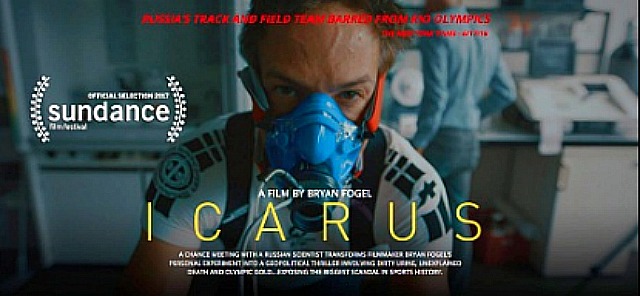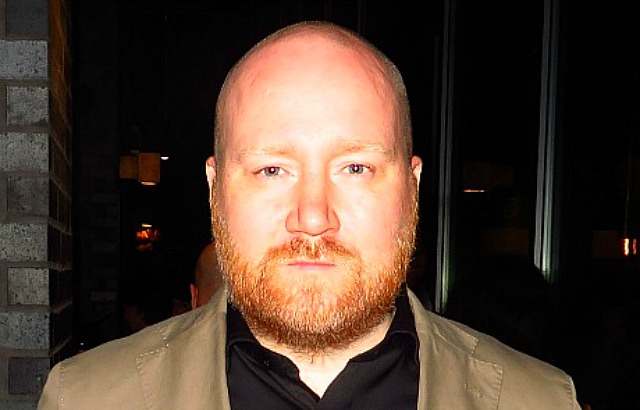None of this year’s Best Picture nominees delivered anything close to the currents in Alexander Payne‘s The Descendants, particularly in those two scenes between George Clooney, Matthew Lillard and Judy Greer. Six years ago, feels like longer.
None of this year’s Best Picture nominees delivered anything close to the currents in Alexander Payne‘s The Descendants, particularly in those two scenes between George Clooney, Matthew Lillard and Judy Greer. Six years ago, feels like longer.
Posted on 1.26.17 from the Sundance Film Festival: Hollywood Elsewhere loves Icarus, the Russian doping doc that Netflix picked up two or three days ago. I’ve no striking observations or insights to add to the general chorus, but I can at least say that after a slow start Icarus turns into a highly gripping account of real-life skullduggery and paranoia in the sense of the classic William S. Burroughs definition of the term — i.e., “knowing all the facts.”

As noted, Bryan Fogel‘s two-hour film starts off as a doping variation of Morgan Spurlock‘s Super Size Me, and then suddenly veers into the realm of Laura Poitras‘ Citizenfour.
It doesn’t tell you anything you didn’t already know or suspect, mainly that (a) the use of performance-enhancing drugs is very common in sports (everyone does it, Lance Armstrong was the tip of the iceberg) and (b) there isn’t a dime’s worth of difference between Vladmir Putin and his top henchmen and the Al Capone mob of 1920s Chicago — lying, cheating sociopaths of the highest or lowest order (take your pick).
I was a little worried during the Super Size Me portion, in which bicyclist Fogel and Russian scientist Grigory Rodchenkov embark on a project with the goal of outsmarting athletic doping tests. It’s interesting at first, but it goes on too long. After a while I was muttering “so when does the Russian doping stuff kick in?”
Suddenly it does. Rodchenkov gradually admits to Fogel that he orchestrated a Putin-sanctioned doping program that gave the Russian athletes an advantage at the 2014 Sochi Olympic Games, which led to the winning of 13 gold medals.
A little more than two months ago, it was announced that Russia’s Olympic team had been barred from the 2018 Winter Games in Pyeongchang, South Korea. The reason for this historic, forehead-slapping decision can be found in Bryan Fogel‘s Oscar-nominated documentary Icarus, which has been paying on Netflix since last August.
Talk about a timely documentary with the South Korean games just beginning and Russia conspicuously absent from each and every event.


The reason for Russia’s removal from the 2018 Winter Games was initially explained in a 5.12.16 N.Y. Times report about a massive state-run doping program, which has been organized and then exposed by Grigory Rodchenkov, director of Russia’s antidoping laboratory during the 2014 Winter Olympics in Sochi.
The Russian banning came after incontrovertible evidence, supplied by Rodchenkov, of “a brazen and pervasive state-run doping program that has likely tainted Russian results for the entirety of modern Olympic history,” as Vulture‘s Jada Yuan put in last year.
The story of how Rodchenkov came to confess his participation in this massive doping program, and how he was then forced to leave Russia for the U.S. in order to save his life, is the stuff of Icarus, which had its big debut at Sundance ’17 and was re-celebrated last night at Hollywood Athletic Club party on Sunset Blvd.
I’m as startled and saddened as everyone else about the sudden death of composer Johann Johannsson. He was found dead yesterday in his Berlin apartment. Hugs and condolences to family, friends, colleagues and fans of this gifted artist, who was only 48.

I last spoke with Johannsson during the 2014 Toronto Film Festival, when he was doing interviews to promote his Theory of Everything score, which wound up winning a Golden Globe award in early ’15. An amiable fellow, obviously bright, etc.
We actually had our longest chat during the TIFF Theory of Everything after-party. I especially recall Johannsson reminding me about Alex North having composed a rejected score for 2001: A Space Odyssey, and that it’s purchasable online.
I was totally turned around by Johannsson’s churning, disruptive score for Darren Aronofsky‘s mother!.
Johannsson’s last completed score was for Garth Davis‘s Mary Magdelene, which Universal will open on 3.22.
Who dies suddenly at 48?
Johnannson’s scores in no particular order: Denis Villenueve‘s Prisoners, Sicario and Arrival, James Marsh‘s The Theory of Everything and The Mercy, Darren Aronfosky‘s mother!, Panos Cosmatos‘ Mandy, Davis’s Mary Magdalene.